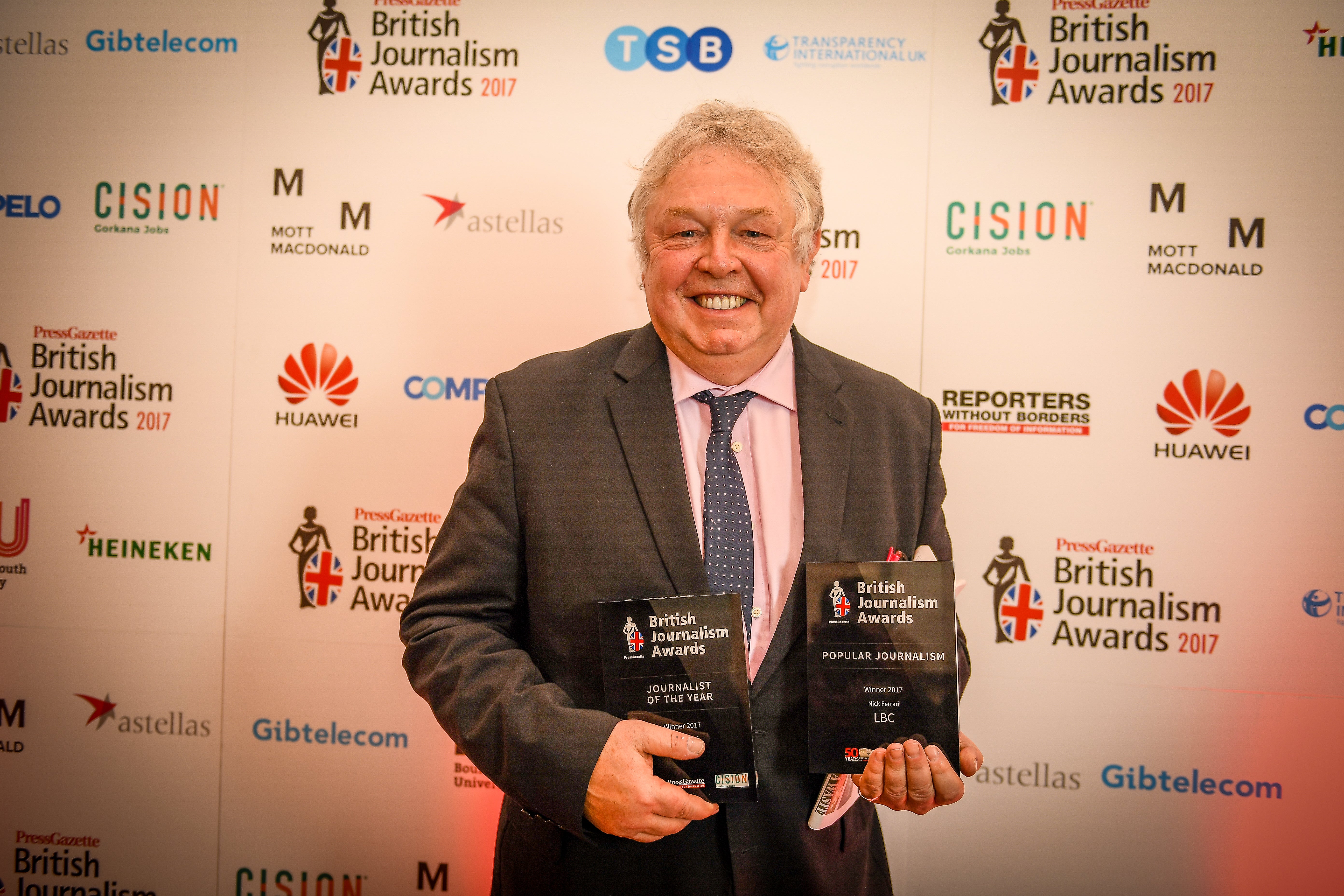
LBC presenter Nick Ferrari has become the first radio broadcaster to be named Journalist of the Year at the British Journalism Awards.
He picked up the prize at the awards dinner on Monday night along with the award for popular journalism. Some 400 journalists from across the industry attended the event held at the De Vere Grand Connaught Rooms.

The judges were impressed with the calm and methodical way he interviews politicians, most notably shadow home secretary Diane Abbott ahead of this year’s general election.
He was also praised for his coverage of the Grenfell Tower disaster and his campaign for a change in the law to protect emergency service staff.
He said: “This means such a huge amount. I came into journalism because my late father ran a press agency.
“I remember Press Gazette as it was then, coming back on a Monday night I would read it – I would read all the events, I would read all the goings on and I read it through my career when I was on a local paper.
“To think now that I have been finally recognised by the judges and I look at the list and see the extraordinary competition I was up against, it really does mean so much. Thank you so much I won’t forget tonight.”
Specialist magazine Inside Housing saw off competition from the national press to win News Provider of the Year for its work highlighting the dangers posed by flammable tower block cladding before the Grenfell tragedy.
Inside Housing’s news editor Peter Apps also won the prize for specialist journalism.
There was posthumous recognition for two journalists at the awards in central London.
Financial Times journalist Paul McClean, who died aged 24 on holiday in Sri Lanka in September, was highly commended in the category of new journalist of the year for his reporting of Brexit.
And former Independent science editor Steve Connor, who died earlier this month, won the science journalism prize for his scoop for the i newspaper about the genetic editing of embryos.
Freelance Gareth Browne was named new journalist of the year for his reports from Iraq for The Times.
The Manchester Evening picked up the Local Heroes for its work in the aftermath of the Ariana Grande concert bombing.
Note all pictures are available for editorial use with credit to Press Gazettem, hi resolution versions here:
Full list of winners and citations:
Technology Journalism, sponsored by Huawei
Winner: Carole Cadwalladr of The Observer
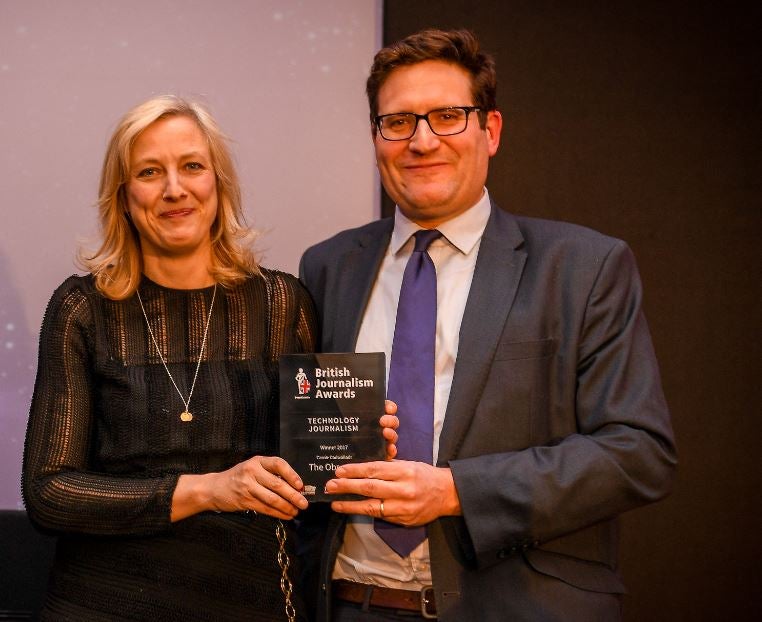
Carol Cadwalladr pictured with Ed Brewster of sponsor Huawei
The judges said: “Carole Cadwalladr’s investigation into the role of tech companies in elections was outstanding journalism which raised a huge number of important issues for democracy and society.
“Tim Berners-Lee quoted from one of her articles article when he spoke up earlier this year on the danger that the unregulated power of the technology companies posed to democracy. This was important work and a deserving winner.”
Highly commended: John Arlidge of The Sunday Times
The judges said: “He is simply a fantastic writer when it comes to technology issues. He takes complex subjects and makes them accessible for everyone.
Features Journalism
Winner: Tom Parry of the Daily Mirror for work which included his report from the “forgotten famine” in Somalia.
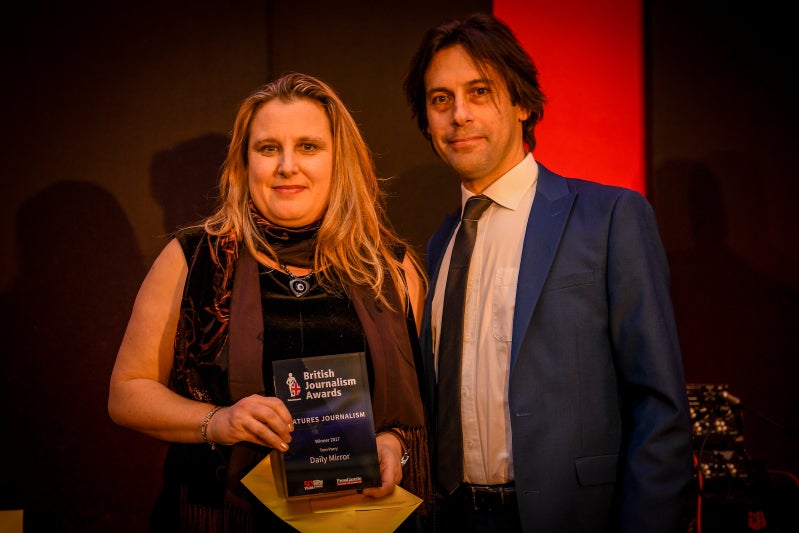
Awards judge Roz Mackenzie with Tom Parry
The judges said: “Tom Parry writes with compassion and flare. With breadth and skill he shines a light on forgotten issues. He was the strongest candidate in a very, very tough field.”
Innovation of the Year sponsored by Google
Winners: Megan Lucero, Maeve McClenaghan, Gareth Davies and Charles Boutaud of The Bureau of Investigative Journalism for The Bureau Local.
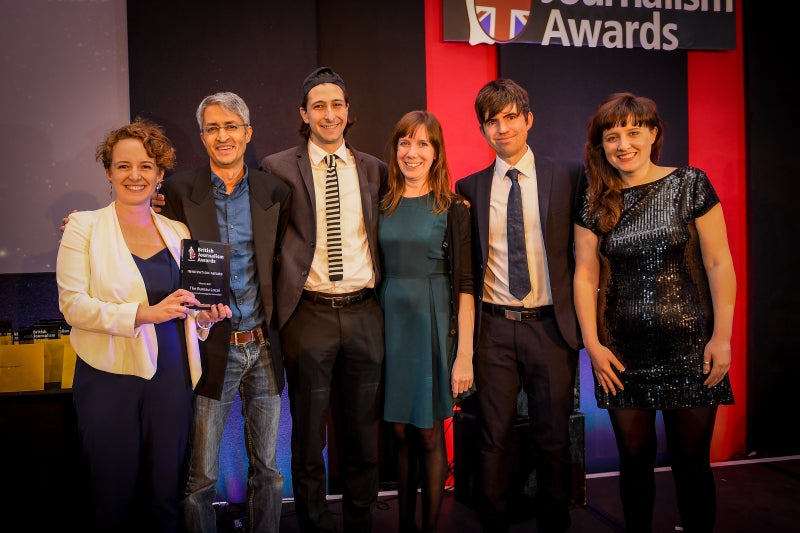
The Bureal Local team with Madhav Chinnappa of Google (second left)
The Bureau Local is a new data unit dedicated to uncovering local public interest stories across the UK. With a 400-striong network it has tackled some of the most important and under reported stories in the UK.
The judges said: “The Bureau Local has found a new way to do things previously thought difficult or impossible, and a way of being efficient at a time when resources are in short supply.”
Arts and Entertainment
Winner: Dan Wootton of The Sun for working including his reports on Ant McPartin’s struggles with addiction and mental health.
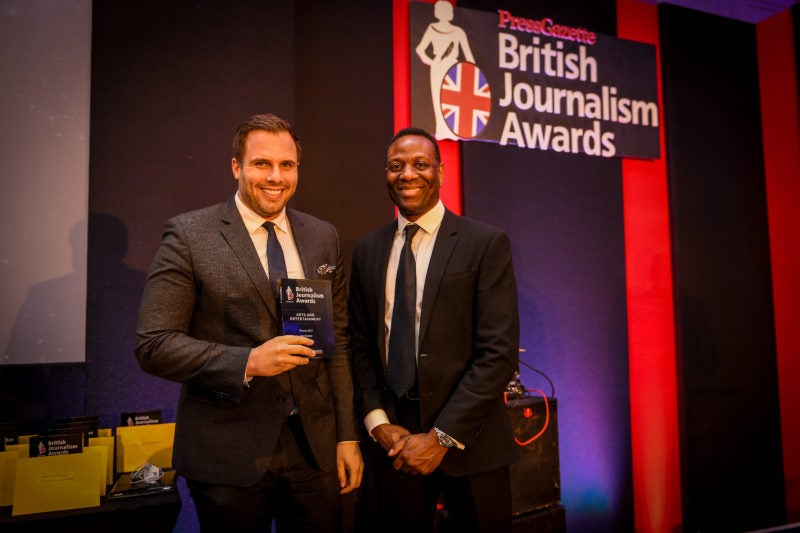
Dan Wootton with awards judge Leon Hawthorne
The judges said: “All three of Dan Wootton’s stories show a showbiz journalist at the top of his game. The interviews show many years worth of earned trust as the celebrities shine a light on public interest issues: addiction, grief and cancer.”
Business, Finance and Economics sponsored by TSB
Winners: Heidi Blake, Jane Bradley, Tom Warren, Richard Holme and Alex Campbell of Buzzfeed News for RBS Dash for cash.
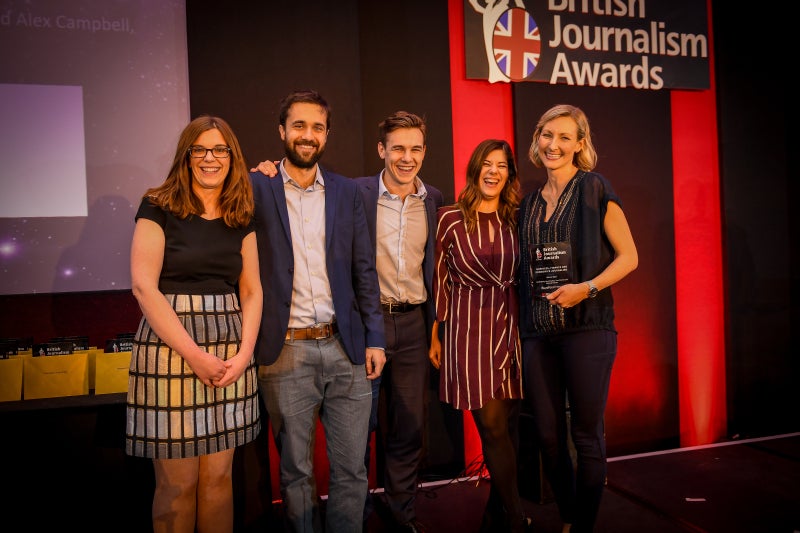
The Buzzfeed team with Abigail Whittaker from sponsor TSB
This investigation revealed how Britain’s biggest taxpayer-owned bank deliberately killed or crippled thousands of businesses during the recession in order to add billions of pounds to its balance sheet. The judges said: “This was stunning work which made your stomach churn. It was a forensic investigation based on thousands of leaked documents brought to life through interviews with the victims of this scandal.”
Politics
Winner: Channel 4 Dispatches for The Battle for the Labour Party
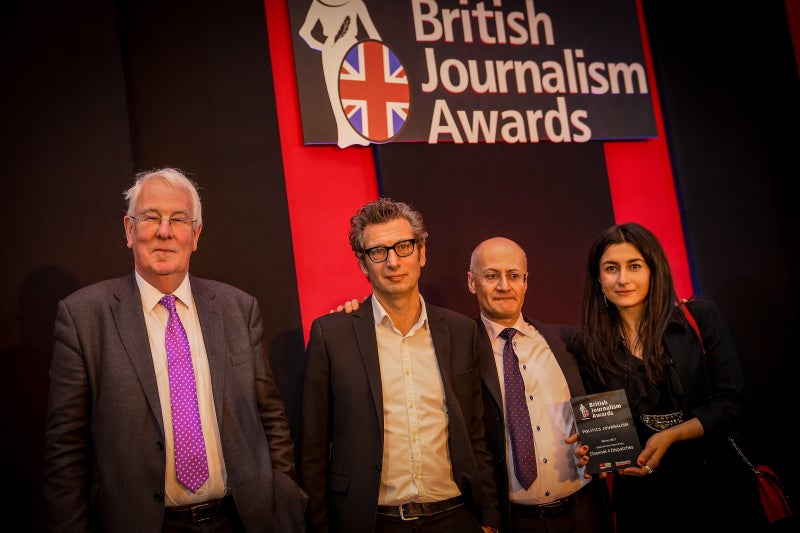
Awards judge Peter Cole with the Channel 4 team
Over a period of six months, Chanel 4’s undercover reporter attended meetings at Momentum’s headquarters in London uncovering new evidence of how it was being influenced by the hard left.
The judges said: “Of all this year’s entries the story this investigation uncovered was the most momentous for the future of British politics. The others might have been great scoops or great insights but they won’t have as much long-term impact as the undercover account of the transformation of a great political party.”
Comment Journalism, sponsored by Heineken
Winner: The Guardian’s Aditya Chakrabortty, whose articles include: “Your new iPhone’s features include oppression, inequality – and vast profit.”
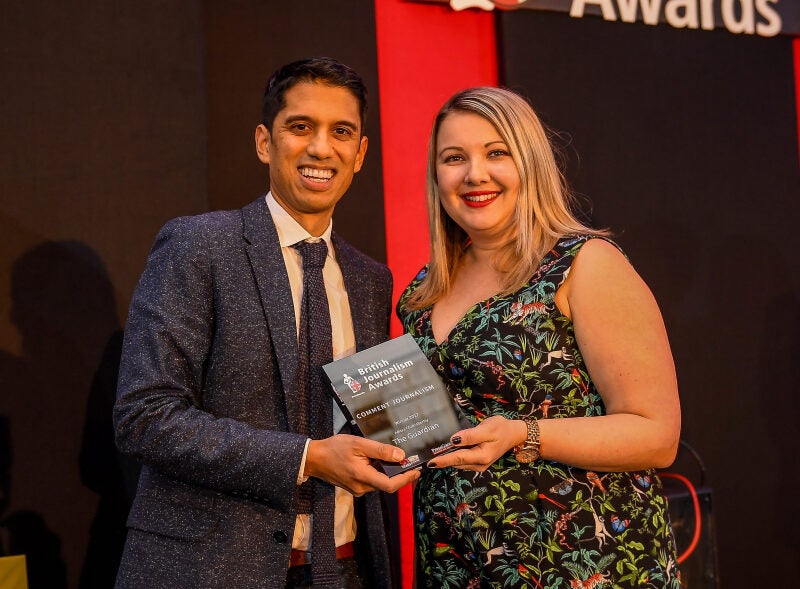
Aditya Chakrabortty with Joanna Dring from sponsor Heineken
The judges said: “Aditya Chakrabortty’s work is erudite and he uncovers the facts to back up his arguments. He writes with passion and authority on an unpredictable range of subjects. Whether you agree or not you have to admit that he expresses his views eloquently.”
Campaign of the Year sponsored by Bournemouth University
Winner: Bryony Gordon and The Telegraph for Changing Minds.
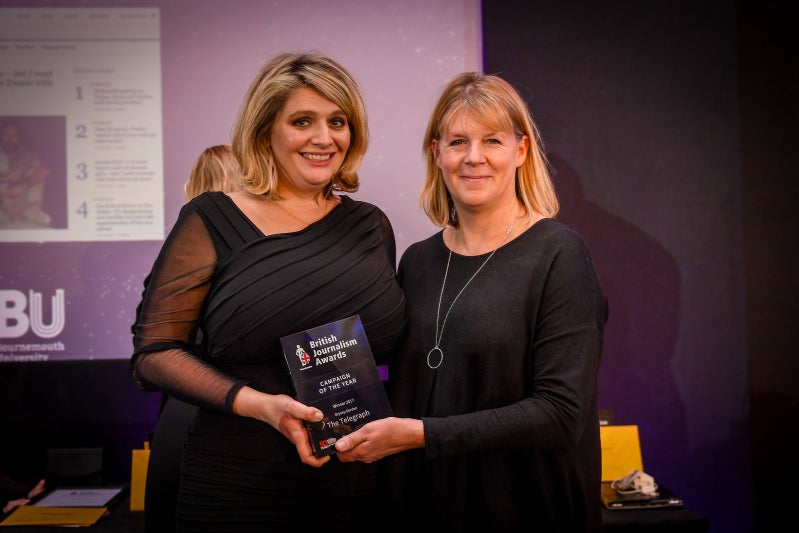
Bryony Gordon with Karen Fowler-Watt from sponsor Bournemouth University
Having charted her own struggles with mental health Bryony Gordon led a campaign which shone a light on the issue both nationally and internationally. Her podcast interview with Prince Harry included the revelations about his own struggles with mental health in his twenties.
The judges said: “As gripping as it is emotional, this campaign hits all the right buttons to drag the public’s attention to consider a subject all too often swept under the carpet. A global game-changer of a campaign.”
Highly commended: The London Evening Standard for Food for London.
The judges said: “Food waste is something we all knew about but this campaign brought into prominence and challenged readers and those in power to make a difference. It had stunning results which made a real difference to the lives of Londoners.”
Photojournalism
Winner: Stefan Rousseau of the Press Association
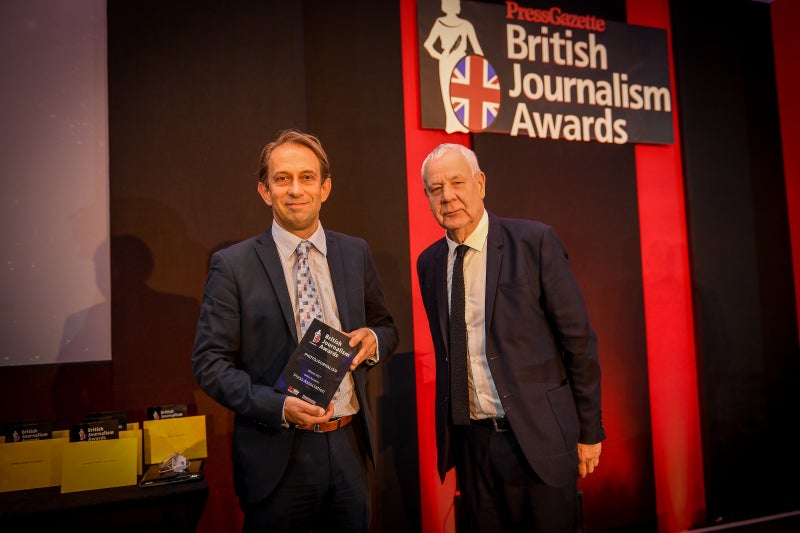
Stefan with awards judge Paul Charman
The Judges said: “When terror came to Westminster and to the workplace of many journalists a combination of lightning reactions, nerves and skills enabled Stefan Rousseau to capture the moment in a dramatic series of shots. The best camera in the world is the one you’ve got with you at the right time. Stefan was there, and he had his camera.”
Science and Health Journalism, sponsored by Astellas
Winner: The late Steve Connor for his front page scoop for i: “One giant step for designer babies.”
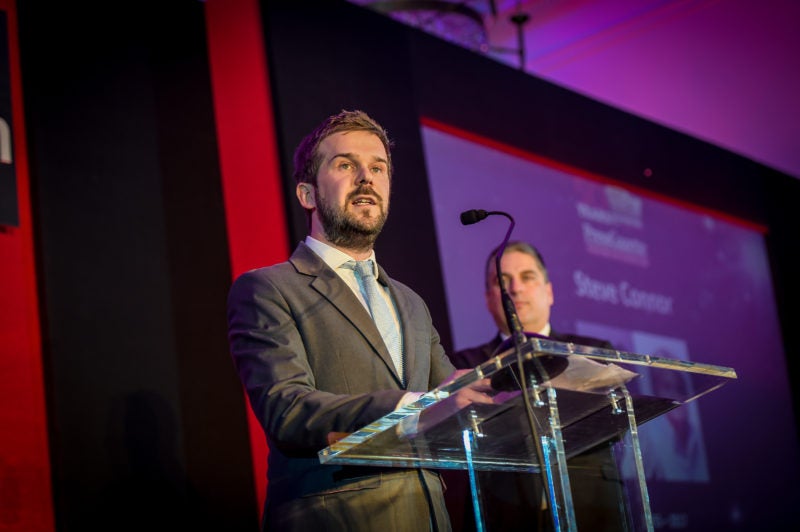
i editor Oly Duff
The judges said: “This was a genuine world exclusive on a massive development in the world of science. It is a subject that many people don’t understand, but Steve Connor made it captivating and got it on the front page.
“With no access to embargoed information, this story was secured by old-fashioned source-based journalism after Steve heard that US researchers were working on techniques which would allow them to gentically modify embryos. A week later his story was confirmed by publication of an official study in the journal Nature.”
Sports Journalism
Winner: Daniel Taylor of The Guardian for his reports on child abuse in football, including: “‘When I started talking to players about the abuse they suffered, I couldn’t believe how deep it ran into football’.”
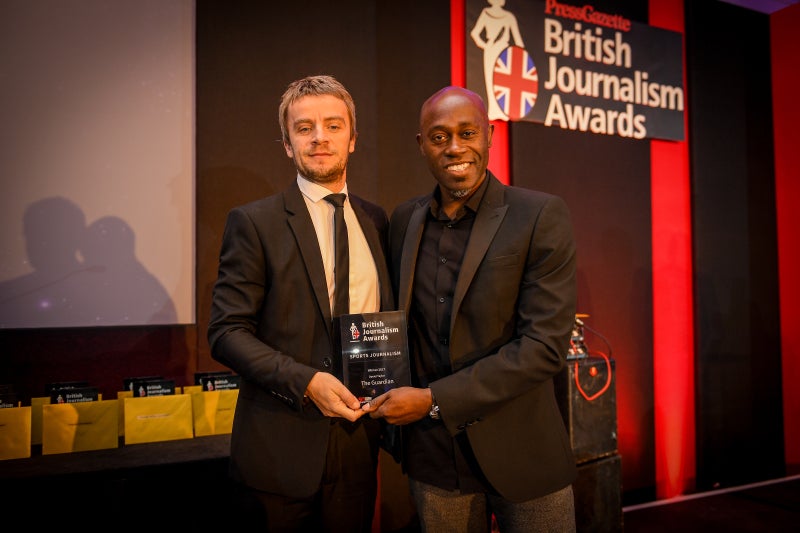
Daniel Taylor with awards judge Henry Bonsu
Daniel Taylor’s interview with former Crewe Alexandra and Bury footballer Andy Woodward had profound and far reaching effects. In waiving his right to anonymity and revealing childhood abuse Woodward said he feared there could be many more victims of historical sexual abuse in the game.
Six months later the National Police Chiefs’ Council said detectives were examining possible attacks on 741 people who had come forward since Taylor’s article. It had identified 276 potential suspects and 328 affected clubs at all levels of the game.
The judges said: “Daniel Taylor’s journalism opened the floodgates and gave people the courage to speak out. These were compelling interviews, brilliantly researched which exposed a cancer at the heart of the national game.”
Highly commended: Sam Cunningham of the Daily Mail for work including: “FA’s £40,000 to girl striker ‘bullied out of England squad’.”
The judges said: “His revelation of that footballer Eni Aluko had been bullied out of the England square was a great sports story, with resonance in wider society. It showed the FA was still addicted to covering up rather than cleaning house.”
Infrastructure, Development and Construction, sponsored by Mott MacDonald
Winner: Will Hurst of Architects’ Journal, for work including: “TfL hit by Garden Bridge conflict of interest claims”.
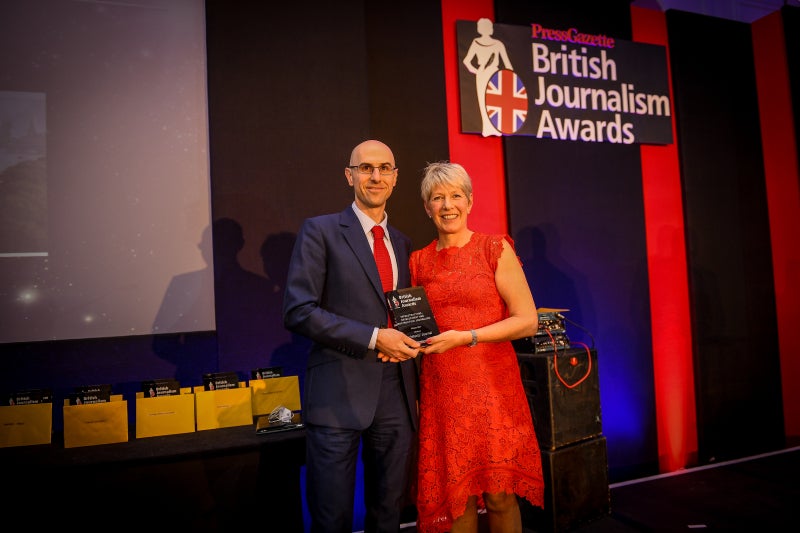
Winner Will Hurst with Cathy Travers from sponsor Mott Macdonald
This investigation exposed allegations of mismanagement and cronyism helping to bring about the cancellation of the £200m garden bridge scheme.
The judges said: “Will Hurst took an issue on which there was seeming consensus and poked away, digging out the scheme’s contradictions through freedom of information and other journalistic tools.”
Popular Journalism
Winner: Nick Ferrari for work which included his headline-making interview with Diane Abbott.
The judges said: “Nick will be most remembered most this year for an interview with shadow home secretary Diane Abbott which proved to be a pivotal moment in the 2017 general election. Through calm and detailed questioning he created the ‘where were you’ moment of the election.”
Foreign Affairs Journalism, sponsored by GibTelecom
Winners: Ramita Navai, Patrick Wells and Mais al-Bayaa of Channel 4 Dispatches for “ISIS and the Battle for Iraq”.
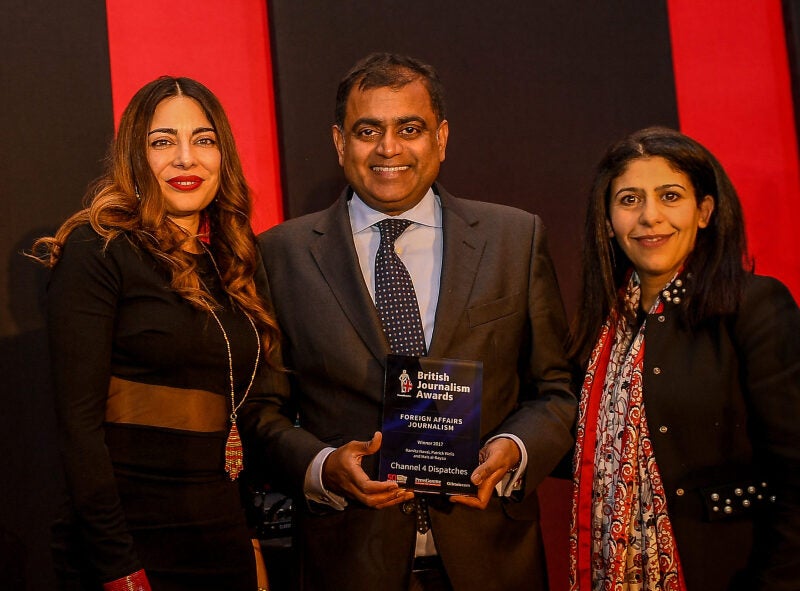
Ramita Navai and Mais al-Bayaa with Rab Paramothayan of sponsor Gibtelecom
The judges said: “Ramila Naval’s reports for Channel 4 added something different and vital to understanding the future of Iraq: the role of the Shia militias and the fear they spread amongst Sunnis. Navai is brave (like everyone else this category) but she opened up a new road of understanding: cool, direct, inclusive, with a real sense of time and place.”
Local Heroes
Winner: The Manchester Evening News for its coverage in the wake of the murder of 22 people by a terrorist at an Ariana Grande Concert.
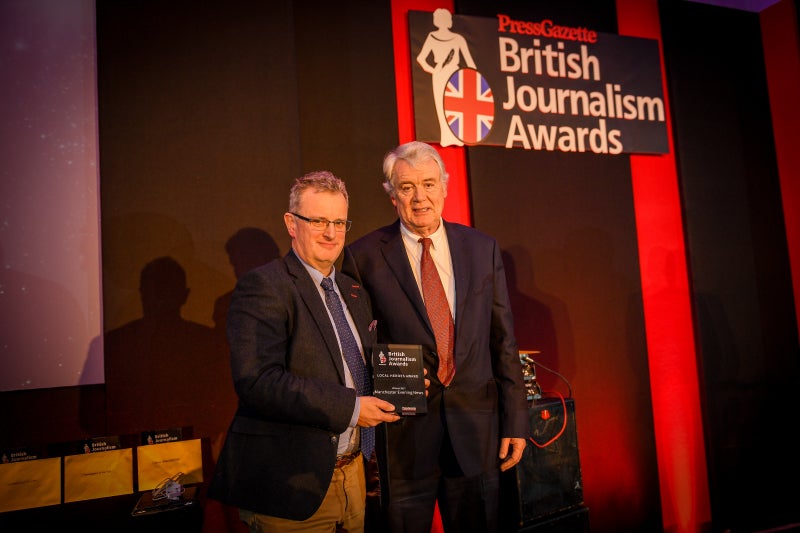
Manchester Evening News editor Rob Irvine with awards judge Jon Slattery
At 10.30pm on Monday 22 May a bomb exploded at a pop concert in Manchester City Centre which would kill 22 people. By 9am the following the day the Manchester Evening News was in print with 34 pages of coverage.
In the days and weeks the followed it did an exemplary job of not just telling the story of biggest terrorist outrage in the UK since 2005 – but of also helping its traumatised community to heal.
A lighter moment came when the editor of Boston Globe arranged a delivery of pizzas to the MEN newsroom in the days after the bombing
The judges said: “The MEN is a newspaper that is sure of itself, knows its patch and showed complete commitment to covering both the initial story of the arena bombing and its aftermath.”
Highly commended: Jonathan Gibson of BBC Birmingham, for work including: “NHS prescription drugs being sold illegally by patients.”
The judges said: “These were local investigations which had national significance.”
Highly commended: Conor Spackman, Richard Newman, Gwyneth Jones and Jeremy Adams of BBC Northern Ireland spotlight for “Burn to earn” – renewable heating incentive wasted millions.
The judges said: “This was a wide-ranging investigation which helped bring down a government.
New Journalist of the Year
Winner: Gareth Browne (freelance for The Times). His three shortlisted reports for The Times include his account of the massacre of more than 200 at a village to the south of Mosul.
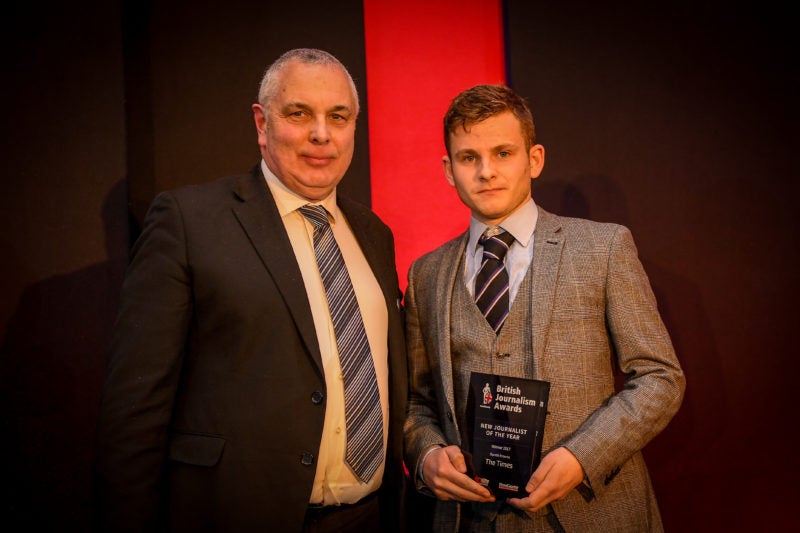
Gareth Browne with awards judge Paul Lashmar
Gareth Browne relocated to Northern Iraq aged just 22 in September 2016 and covered the nine-month battle for Mosul as a freelance. One of his first stories for The Times exposed the massacre of 200 villagers because they stood up to IS.
The judges said: “He’s got the guts, he’s got the scoops, he’s got the talent – and on top of that he’s got youth and energy. A winning combination.”
Highly commended: Paul McClean of the Financial Times, for stories including: After Brexit:the UK will need to renegotiate at least 759 treaties
The judges said: “This was superb in-depth financial reporting from an exceptionally promising young journalist. Paul McClean produced some outstanding exclusives for the Financial Times and was a journalist with huge potential which tragically will not now be realised. The British Journalism Awards judges would like to salute him and pay tribute to his memory.”
Specialist Journalism
Winner: Peter Apps of Inside Housing for “A Stark Warning”, his report on the dangers posed to tower block safety by flammable cladding.
When flames tore through a tower block in Shepherd’s Bush in August 2016, Pete Apps was the only journalist who recognised the need to dig further – and in doing so uncovered a secret report that warned of the threat to tower blocks from external cladding weeks before the Grenfell disaster.
The judges said: “Simply outstanding investigative journalism covering one of the most shocking stories of our era. A strong understanding of traditional public interest value combined with the adoption of the latest technology in multi-media reporting.”
Highly commended: Alison Holt of BBC News, for work which included: “Poor children ‘more likely to be put in care’.”
The judges said: “This was a remarkable and awe-inspiring body of work with far-reaching impact. The supporting multi-media articles, such as the care calculator, are truly products of the BBC at its best and serve the public interest as well as being of huge interest to the public.”
Scoop of the Year
Winner: “Labour MP Keith Vaz and the prostitutes in his flat” by Nick Dorman for The Sunday Mirror.
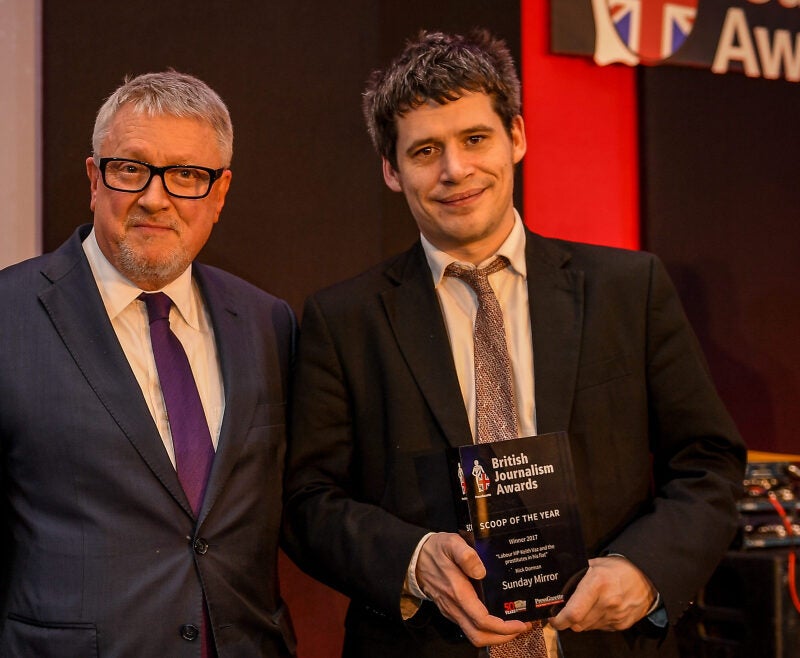
Awards judge Fergus Shanahan with Nick Dorman of the Sunday Mirror
The judges said: “This was the jaw dropping scoop of the year, totally backed up, brilliantly displayed and the one that made your eyes pop out of your head as you read it. A classic example of a newspaper exposing hypocrisy in the corridors of power.”
Global Investigation of the Year
Winner: “Abuse at the UN” by Karin Mattisson, Joachim Dyfwermark and Ola Christoffersson of Swedish Television’s Mission Investigate.
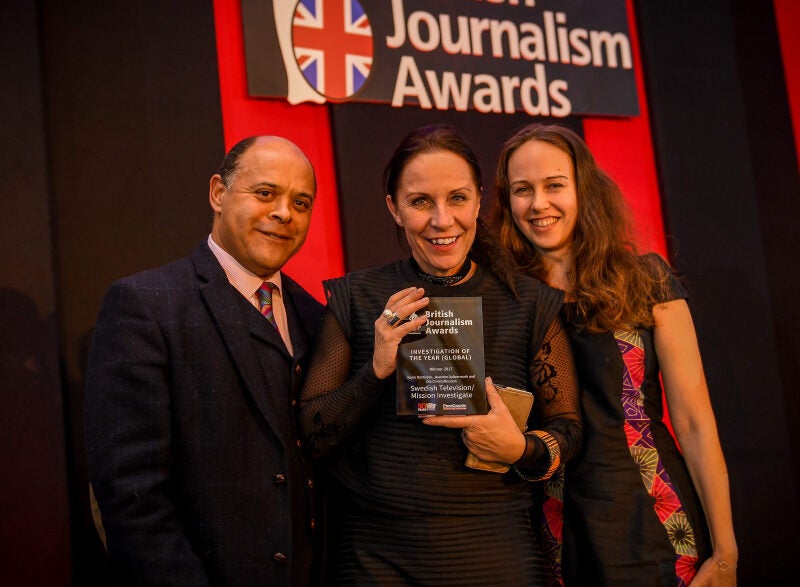
Awards winners with judge Kurt Barling left)
The judges said: “The UN is a big target and this investigation had huge impact. They found tand interviewed the victims in the Central African Republic, chased down the guilty parties and held those responsible to account.”
Investigation of the Year, sponsored by Transparency International
Winner: “Syria’s Disappeared: The Case Against Assad” by Lindsay Duncan, Nicola Cutcher, Sara Afshar and Callum Macrae for Channel 4 Dispatches.
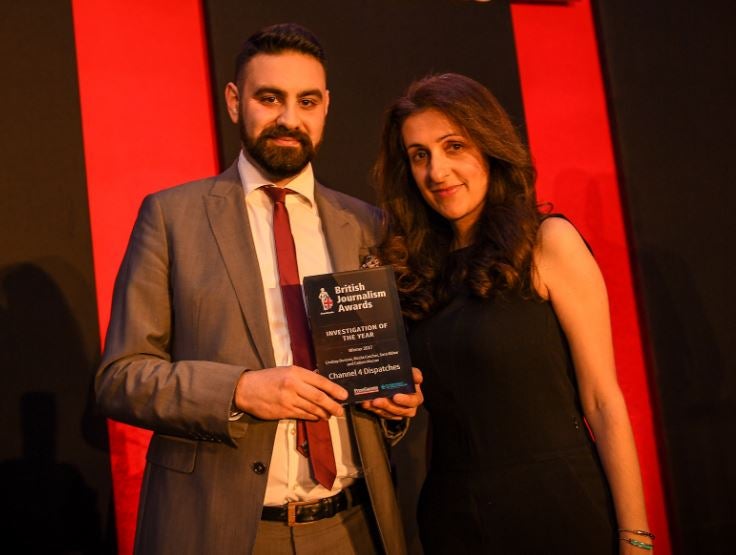
The judges said: “The culmination of eighteen months of investigation, this documentary brought to light the hidden story of tens of thousands of Syrians disappeared by President Assad’s regime into a network of detention facilities.
“This investigation combined incredible research with poignant and moving testimonials. Powerful, shocking and impactful journalism combined with great story telling.”
Highly commended: Peter Apps and Inside Housing for “Revealed: fire spread linked to panels”.
The judges said: “This is the sort of vital investigative journalism in the public interest which we need more of.”
The Marie Colvin Prize
Winner: Erika Solomon of the Financial Times
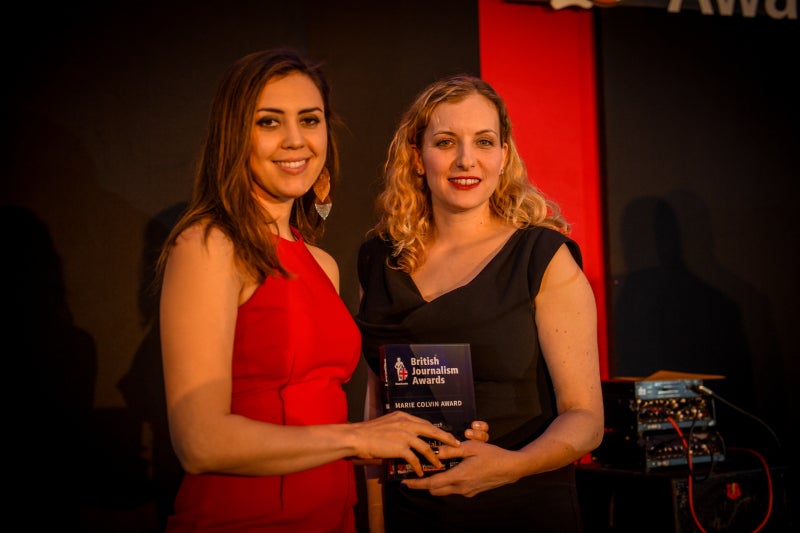
Erika Solomon pictured with Rebecca Vincent from awards sponsor Reporters Without Borders
The judges said: “Financial Times Middle East reporter Erika Solomon approaches her subjects with the same humane curiosity as Marie did and she writes in the same way too, bringing out through subtle observation and understatement the way that people cope in the most terrible circumstances. This is foreign reporting at its best.
“Her reports were strong, original and showed huge bravery. She is 31, an up and coming reporter in Marie’s mould.
“It was notably brave of her to visit Baba Amr, the district of Homs where Marie died, during an epic journey around Syria for the third of these pieces.”
News Provider of the Year
Winner: Inside Housing
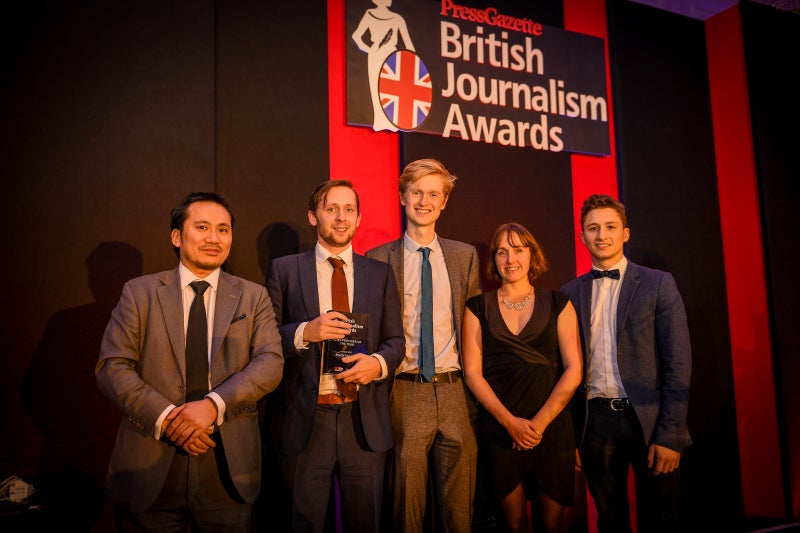
The Inside Housing team with guest of honour Geoff Ho of the Sunday Express – left
The judges said: “Inside Housing was the one news organisation which was fighting for the interests of Grenfell Tower residents before this summer’s disastrous fire.
“It highlighted the dangers posed to tower block safety by flammable cladding panels weeks before the Grenfell tragedy. It went on to carry out forensic, impactful and painstaking research into fire safety at tower blocks around the country.
“’Grenfell: The Paper Trail’ sifted through seven years of documents to expose a council which put saving money at the forefront when it come to refurbishing properties and which ignored a 2010 fire safety review.”
Journalist of the Year, sponsored by Gorkana Jobs
Winner: Nick Ferrari
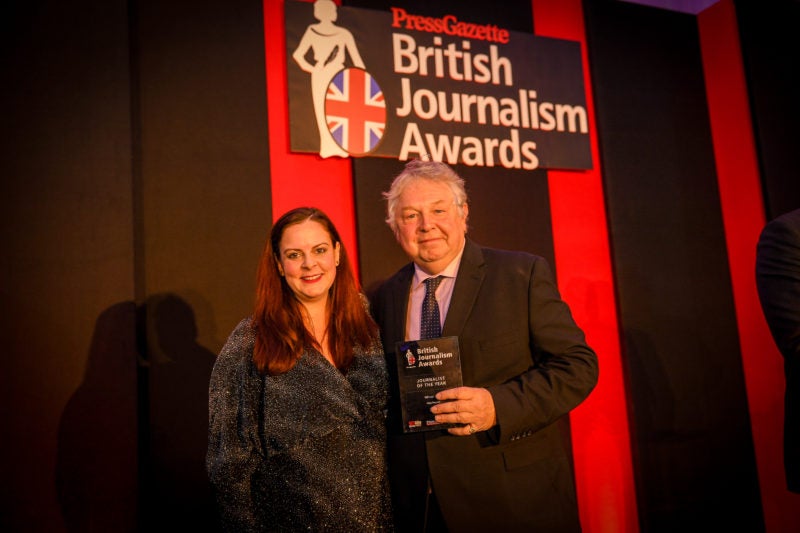
Nick Ferrari pictured with Ashley Richardson, jobs manager at Gorkana
The judges said: “Eschewing the hectoring style often associated with heavy-hitting political interviews, Nick Ferrari’s focus on the facts, ability to think on his feet and lightness of touch secured his status as a star performer during the 2017 election campaign. As well as his famous encounter with Diane Abbott he also secured headline-grabbing interviews with Theresa May and Tim Farron.
“In 2017 he launched the Guard Our Emergency Staff campaign which prompted a 100,000 signature petition and helped bring about the Assaults on Emergency Workers Bill.
“As the Grenfell Fire still smoldered he interviewed former Chief Fire officer Ronnie King who revealed the government’s failure to act on safety recommendations following the Lakanal House fire in 2009. Nick Ferrari is quite simply the 2017 journalist of the year.”
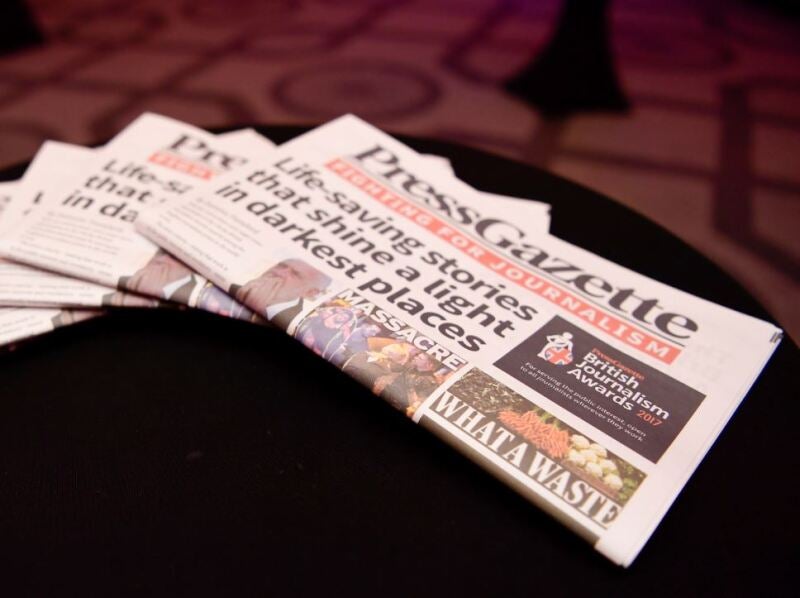
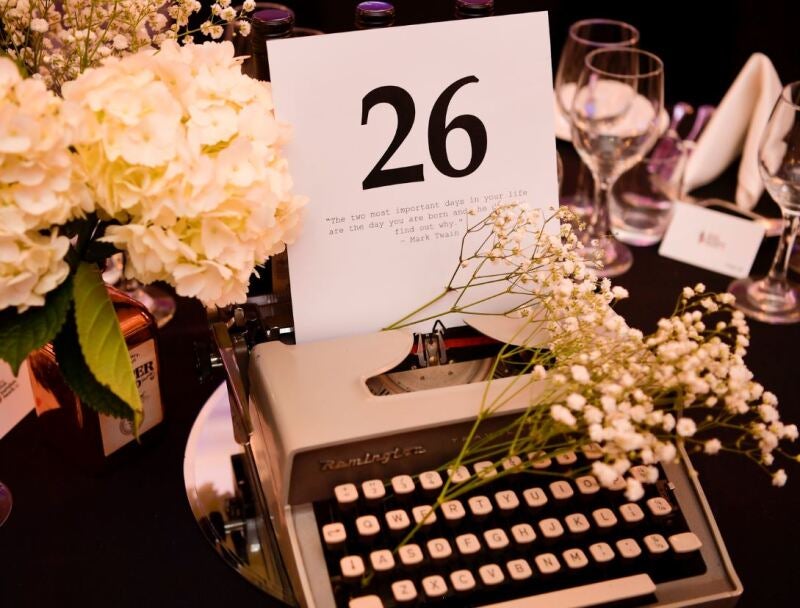
Email pged@pressgazette.co.uk to point out mistakes, provide story tips or send in a letter for publication on our "Letters Page" blog

